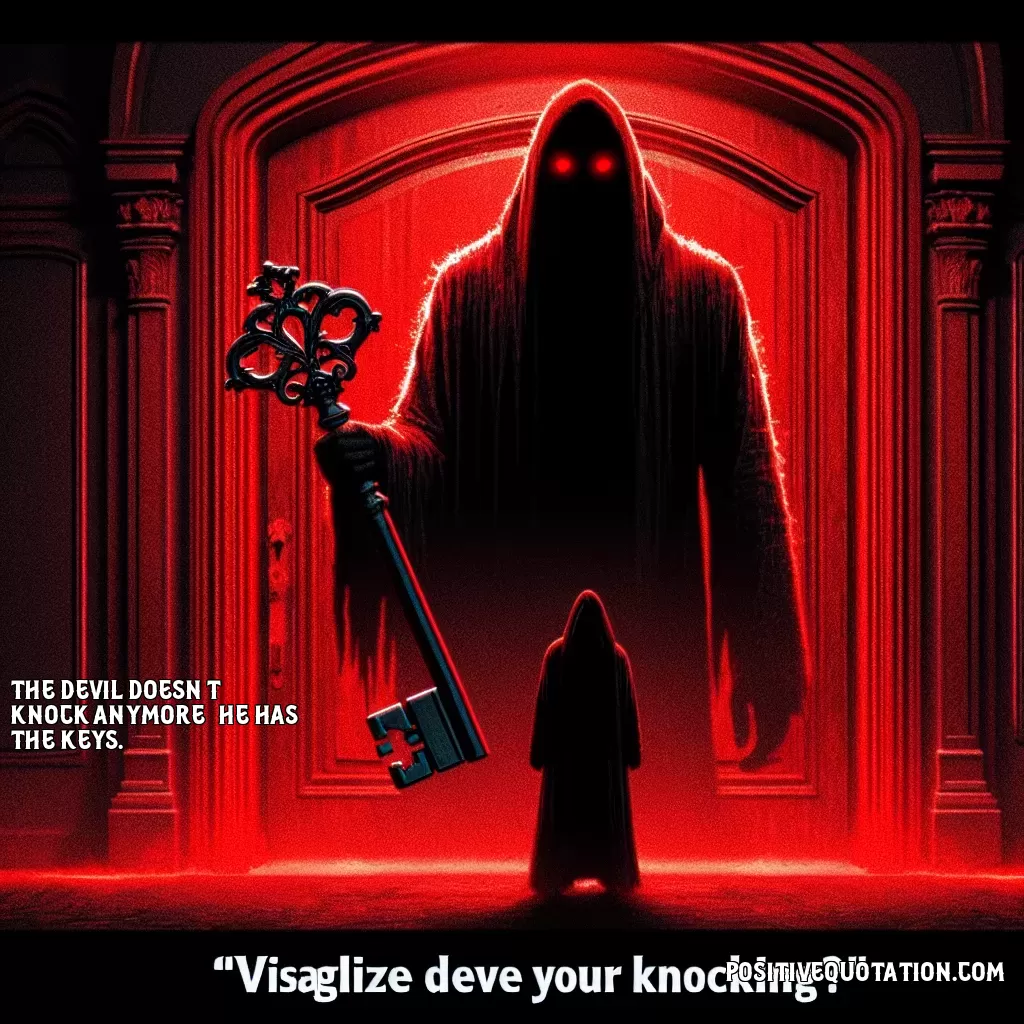
The devil doesn’t knock anymore he has the keys.
Author: Robert McCammon
👁️ 19 views
This quote, "The devil doesn’t knock anymore he has the keys," metaphorically suggests that negative influences, temptations, or destructive elements in our lives have become so pervasive and ingrained that they no longer need to seek permission or introduce themselves before entering. Traditionally, the "devil" represents evil or adverse forces. When someone knocks, there is an implication of seeking entry or permission. However, if the "devil has the keys," it means that these negative forces have unrestricted access, symbolizing a loss of control or a blurring of boundaries. In many contexts, this can mirror how, in modern society, harmful influences such as consumerism, addiction, misinformation, or social pressures infiltrate our lives. These elements may have once required conscious decision-making or moral consideration to enter our psyche and lifestyle. However, as they become normalized, they bypass our defenses, entering without obstacles, much like having a key. This could caution us about the dangers of becoming desensitized to harmful behaviors or ideologies. The quote might also suggest the subtlety and disguise of these "devils" in everyday life. Initially, one might recognize and reject outright harmful influences. But over time, these influences get camouflaged with convenience and allure, making one less vigilant, allowing them access like someone with a key. Therefore, it serves as a warning to maintain awareness, set boundaries consciously, and critically evaluate what we allow to infiltrate our lives, as not everything that appears benign truly is. It encourages us to secure the metaphorical doors of our minds and spirits, reclaiming the keys to our integrity and well-being.
Quote By: Robert McCammon
**Robert McCammon: A Master of American Horror Fiction**
Robert McCammon, born on July 17, 1952, in Birmingham, Alabama, is a prominent figure in American horror and thriller literature. Growing up in the Deep South, his surroundings heavily influenced his writing style and themes, often reflecting the complexities of Southern culture and history. McCammon's journey as an author began in the late 1970s, and he quickly became known for his compelling narratives and richly drawn characters.
After earning a degree in journalism from the University of Alabama, McCammon initially worked as a writer and editor for various publications. However, it wasn't long before he shifted his focus to fiction. His debut novel, "Baal," was published in 1978, but it was his subsequent works that truly established him as a master of horror. With "Swamp Thing" (1982) and the critically acclaimed "They Thirst" (1981), McCammon garnered a loyal readership and solidified his reputation within the genre.
One of McCammon's most significant contributions to literature is his novel "Boy's Life" (1991), a semi-autobiographical work that blends coming-of-age elements with a touch of supernatural horror. This novel not only showcases McCammon's ability to evoke nostalgia but also his skill in creating suspenseful and thrilling narratives. "Boy's Life" won the Bram Stoker Award and remains a favorite among fans and critics alike.
Throughout his career, Robert McCammon has published numerous bestsellers, including "Mine" (1990), "Speaks the Nightbird" (1993), and “The Border” (2015), displaying a versatility that spans beyond the horror genre into historical fiction and thrillers. His novels often explore themes of human resilience, morality, and the darker aspects of human nature. While he temporarily stepped away from writing in the late 1990s, citing a need to reevaluate his career, McCammon returned to the literary scene in 2013 with "Speaks the Nightbird," to the delight of his long-time fans.
Robert McCammon's enduring legacy continues to influence aspiring writers and captivate readers around the world. Through his ability to tell haunting stories infused with rich Southern heritage, McCammon places a significant mark on the literary landscape, earning him the status as a beloved author in the realms of horror and beyond.